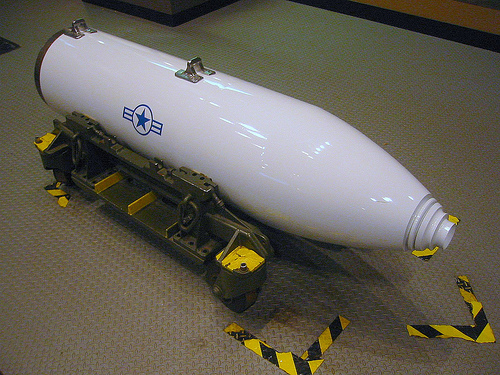Bipartisan Group Produces Crash Course on Nuclear Threats,Countermeasures
The number of nuclear weapons worldwide has declined significantly, but the United States must continue to work to counter worldwide nuclear threats, said the American Security Project (ASP) in a report released on Monday. Since the end of the Cold War, the U.S. and Russia have reduced the number of operationally deployed nuclear weapons by 75 percent.
The U.S. “cannot afford to be complacent” when it comes to working to secure the world’s nuclear weapons, according to the organization’s Nuclear Security Index (NSI), a report created to educate policymakers and the public on the current nuclear situation.
“We believe that America must lead other nations in the pursuit of our common goals and shared security. We must confront international challenges with all the tools at our disposal,” retired Marine Corps general and CEO of ASP Stephen Cheney said.
The NSI aims to relay four key facts about global nuclear threats, according to an accompanying press release:
1. The U.S. and its allies and partners still face a wide range of nuclear threats;
2. There are many different kinds of tools to address nuclear threats, such as: military strength, nuclear deterrence, international agreements and organizations, and technological investments like ballistic missile defense;
3. A nuclear weapon cannot be compared to an ordinary bomb since the use of a single nuclear weapon would cause mass devastation and have profound effects on global stability; and
4. To date, only a small number of nations pose a near-term, urgent nuclear proliferation risk. Preventing such threats from escalating in the future will depend on careful leadership and cooperation from all like-minded states working together to enforce common norms.
"20 years after the end of the Cold War, and 10 years after the terrorist attacks of 9/11, the nuclear security debate has not fully adjusted to modern realities and threats. The United States has not yet fully articulated a strategy for dealing with Iran's questionable nuclear activities, the threat of nuclear terrorism, or the utility of nuclear deterrence in the 21st century. The Nuclear Security Index provides an excellent primer on these vital issues and will equip readers to understand the latest headlines as well as longer-term nuclear trends," said Dr. Janne Nolan, director of Nuclear Security Programs at ASP.
The report also notes that Iran, North Korea, and Syria are the states most commonly seen as a nuclear proliferation threat and lists India, Israel, North Korea, and Pakistan as countries that have yet to sign the Nuclear Nonproliferation Treaty.
Download the full report below.
NuclearThreatsAndCountermeasures.pdf
photo byfutureatlas.com/flickr
